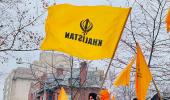Three Indian nationals accused of killing Khalistan separatist Hardeep Singh Nijjar last year have appeared before a Canadian court through video for the first time to face homicide charges in a case that has soured Canada-India relations.

Karan Brar, 22, Kamalpreet Singh, 22, and Karanpreet Singh, 28, all Indian nationals residing in Edmonton, were arrested and charged on Friday with first-degree murder and conspiracy to commit murder.
They appeared separately by video in front of a packed Surrey provincial courtroom on Tuesday to acknowledge the charges of first-degree murder and conspiring to commit murder and to agree to have their cases adjourned to May 21 to give them time to consult with their lawyers, the Vancouver Sun newspaper reported.
The three -- believed to be connected to the Lawrence Bishnoi gang -- appeared before the Surrey Provincial Court in British Columbia province, the report said.
Each of them appeared separately from North Fraser Pretrial Centre wearing jail-issued red T-shirts or sweatshirts and sweatpants..
Two of the accused appeared in the morning while Kamalpreet Singh's appearance was delayed until after lunch to give him time to consult with a lawyer.
All three agreed to have the proceedings heard in English and each of them nodded that they understood the charges of first-degree murder and conspiring to murder Nijjar, the report said.
The court granted the Crown prosecutor's request for a no-contact order naming seven people under a Canada Criminal Code section that bans the accused from communicating directly or indirectly with any of them.
Those named on the order are Nijjar's son Balraj Nijjar, 21, and Harjinder Nijjar, Mehtab Nijjar, Sarandeep Sehaj, Harsimranjeet Singh, Arshdeep Kapoor and Malkit Singh, the report added.
The three accused men had a brief appearance before an adjudicator on Saturday for an interim judicial release hearing, after which they were kept in custody.
Their next step would be to have their lawyers apply for bail, said Surrey criminal and immigration lawyer Affan Bajwa, who has no connection to the case.
Bajwa said their chances of being released on bail would depend on whether their lawyers could make a strong case to the judge.
“I think it may be difficult for them to be released on bail because of a possible flight risk and risk to public safety,” he said.
Bajwa also said if the case goes ahead, the men would be tried in Canada and if found guilty of first-degree murder would have no chance of parole for at least 25 years.
If they are foreign nationals or permanent residents, as soon as they're released, they would face a deportation hearing by the Canada Border Services Agency, he said.
If found not guilty, they could still be deported, according to a Supreme Court of Canada ruling in September in which the nine judges unanimously ruled that a foreign national could be deemed inadmissible to Canada on security grounds under the Immigration and Refugee Protection Act of “being a danger to the security of Canada,” according to Canadian Lawyer Magazine, the Vancouver Sun report said.
Hundreds of local Sikhs carrying Khalistan flags and posters showed up at the courthouse.
Nijjar, a Canadian citizen, was shot dead outside a gurdwara in Surrey on June 18, 2023.
The indictments Friday allege the conspiracy unfolded in both Surrey and Edmonton between May 1, 2023, and the date of Nijjar's killing.
The alleged hitmen entered Canada over the past five years and were suspected of involvement in the world of drug trafficking and violence, according to local police.
Citing sources involved in the investigation, CBC News reported that many features of the gang culture from which the Bishnois emerged would be familiar to observers of North American organised crime.
Their business model extends to demanding payments from prominent Punjabis, especially entertainers and those in the "liquor mafia," it said.
"That extortion network soon spread to Canada," said former West Vancouver police chief Kash Heed, who also served as B.C.'s solicitor-general and minister of public safety. "Some of the information I'm very familiar with because the victims have spoken to me and they paid the demand," he told CBC News.
The use of criminal networks by foreign governments to carry out or support overseas operations is the fastest-growing area of national security law enforcement, the report quoted investigators as saying.
India had on Thursday rejected fresh comments by Prime Minister Justin Trudeau on the killing of Nijjar and said the remarks once again illustrated the political space given in Canada to separatism, extremism, and violence.
Trudeau addressed a Khalsa Day event in Toronto recently that was attended by some pro-Khalistan supporters.
The ties between India and Canada came under severe strain following Trudeau's allegations in September last year of the "potential" involvement of Indian agents in the killing of 45-year-old Nijjar.
India has dismissed Trudeau's charges as "absurd" and "motivated."
The presence of Sikh separatist groups in Canada has long frustrated India, which had designated Nijjar a "terrorist."
The police suggested more arrests might be coming. Royal Canadian Mounted Police assistant commissioner David Teboul, the force's commander for the Pacific region, said Friday that he wouldn't comment on the alleged links between the three men arrested and Indian officials but noted the force is "investigating connections to the government of India."
External Affairs Minister S Jaishankar on Saturday said what is happening in poll-bound Canada over the killing of Nijjar is mostly due to their internal politics and has nothing to do with India.
He said a section of pro-Khalistan people are using Canada's democracy, creating a lobby and have become a vote bank.
The ruling party in Canada has no majority in Parliament and some parties depend on pro-Khalistan leaders, he said.
“We have convinced them several times not to give visa, legitimacy or political space to such people which is causing problems for them (Canada), for us and also for our relationship,” Jaishankar said.
But the Canadian government has not done anything, Jaishankar said, adding that India sought the extradition of 25 people, most of whom are pro-Khalistan, but they did not pay any heed.
“Canada did not give any proof. They do not share any evidence with us in certain cases, police agencies also do not cooperate with us. It is their political compulsion in Canada to blame India. As elections are coming in Canada, they indulge in vote bank politics,” the minister said.










